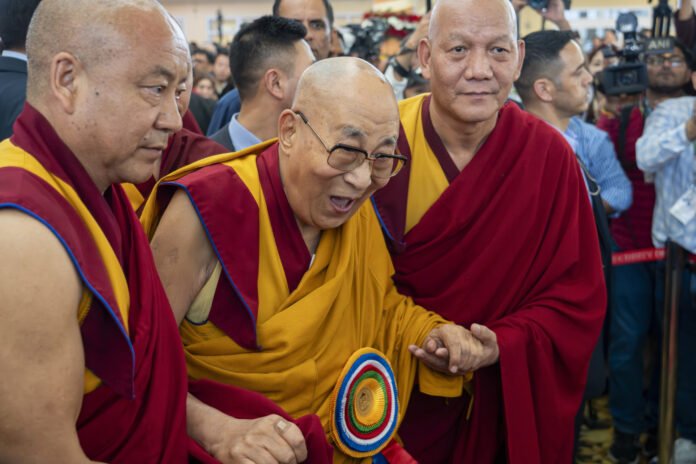The Dalai Lama said on Wednesday that he will have a successor following his death.
“I am affirming that the institution will continue,” he said in a video statement delivered at a major religious gathering in Dharamshala, India, ahead of his 90th birthday on Sunday.
Why It Matters
The announcement comes after speculation around whether the current Dalai Lama might be the last person to hold his role—one that remains a symbol of Tibet’s spiritual and cultural identity.
Outside of religion, the Dalai Lama’s succession holds deep ramifications for the region’s political future.

AP
China’s claim that only its authorities can approve the next Dalai Lama has spurred fears among Tibetans and human rights observers that Beijing may seek to install its own candidate to reinforce control over Tibet.
The Dalai Lama has publicly dismissed China’s authority in spiritual matters, warning his followers to disregard any appointments announced by the Chinese government.
In recent years, U.S. lawmakers have backed calls for religious freedom in Tibet and have enacted legislation rejecting Beijing’s right to appoint the Dalai Lama’s successor.
What To Know
This week, the Dalai Lama addressed more than 100 leading Tibetan Buddhist figures at the event in Dharamshala, reaffirming that the search for his reincarnation would adhere to established religious rituals and be directed by his Gaden Phodrang Trust.
“There will be some kind of a framework within which we can talk about the continuation of the institution of the Dalai Lamas,” he previously said, according to Reuters.
The procedures, rooted in six centuries of tradition, involve senior monks searching for a child believed to be the reincarnation of the previous Dalai Lama, typically using spiritual signs, visions and ritual tests.
The Dalai Lama reiterated that the Gaden Phodrang Trust “has the sole authority to recognize his reincarnation” and he dismissed any outside claims to the process as illegitimate.
Statement Affirming the Continuation of the Institution of Dalai Lama
(Translated from the original Tibetan)
On 24 September 2011, at a meeting of the heads of Tibetan spiritual traditions, I made a statement to fellow Tibetans in and outside Tibet, followers of Tibetan… pic.twitter.com/VqtBUH9yDm
— Dalai Lama (@DalaiLama) July 2, 2025
The Chinese government has repeatedly declared itself the rightful authority over the Dalai Lama’s selection process, a stance Beijing says is based on historical precedent from the Qing dynasty.
Chinese authorities label the Dalai Lama a separatist and say they intend to decide his successor. The Dalai Lama, countering this claim, insisted his reincarnation would be born outside China and accused Beijing of attempting to politicize what has always been a spiritual process.
Dolma Tsering Teykhang, deputy speaker of the Tibetan parliament-in-exile, said China’s approach is “political maneuvering” aimed at undermining Tibetan identity and culture.
The Dalai Lama, who fled Tibet for India in 1959 after a failed uprising against Chinese rule, has repeatedly urged stability and transparency for the succession.
He stepped down from any political role in 2011, passing authority to an elected government-in-exile, and established his foundation to coordinate the reincarnation search outside the reach of political actors.
Newsweek has previously broken down everything you need to know about the current Dalai Lama, his relationship with China and how the next one will be chosen.
What People Are Saying
The Dalai Lama said in a video message: “I am affirming that the institution will continue.”
Youdon Aukatsang, Member of Parliament, Tibetan Parliament-in-Exile said: “(The Dalai Lama) is a binding and unifying force for the Tibetan movement.”
What Happens Next
The Gaden Phodrang Trust is expected to begin formal consultation with senior Tibetan Buddhist leaders and continue preparations for the identification process, should the Dalai Lama pass away. The Chinese government has not signaled an intention to alter its stance, and officials in Dharamshala warn of heightened international scrutiny if Beijing seeks to appoint its own candidate.
